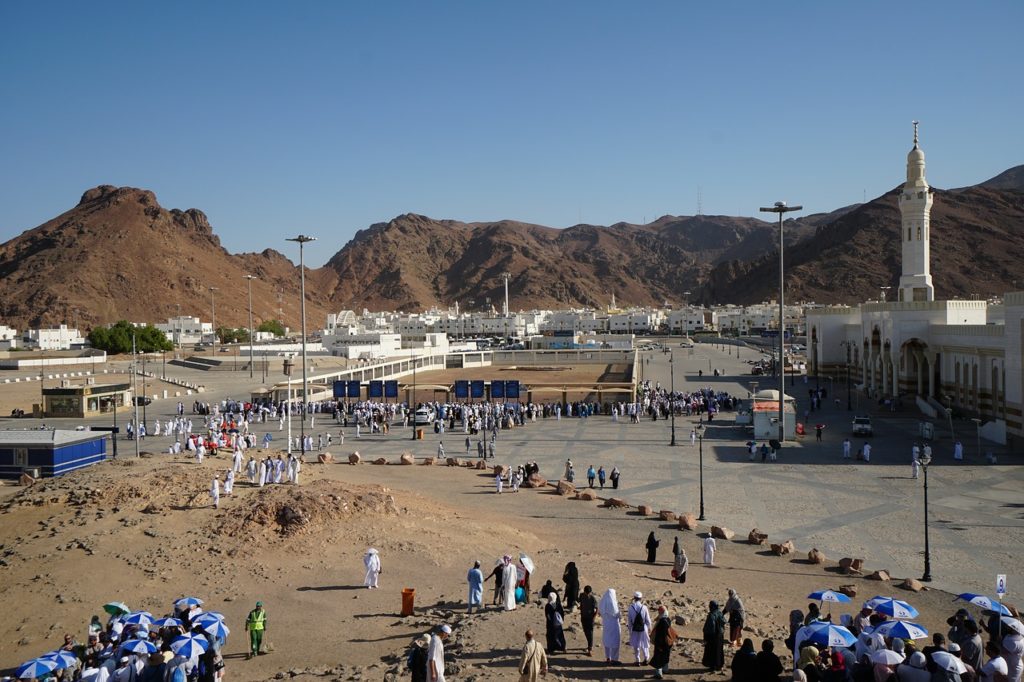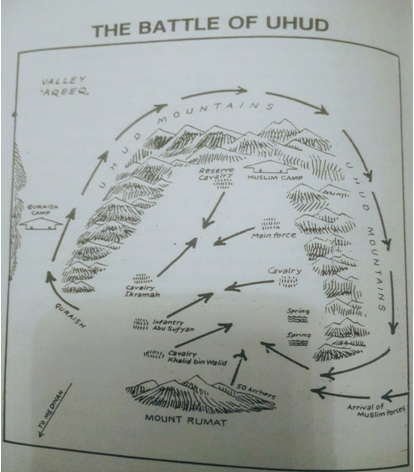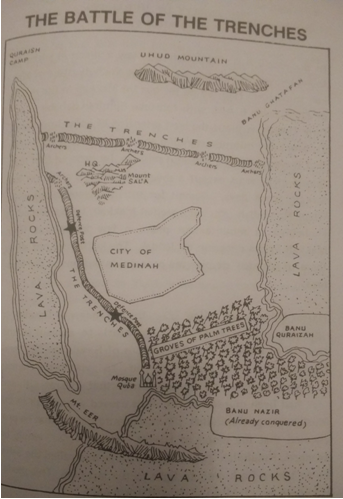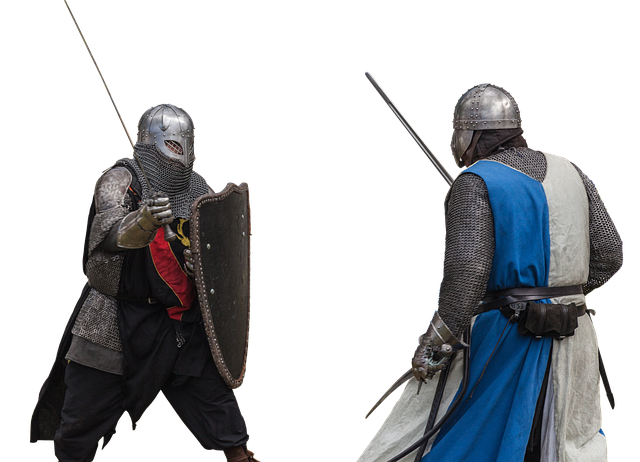
When the Prophet (SAW) reached Madina after the migration, the polytheist Meccans did not let the Muslims live in peace for very long. The steady progress and gaining of strength by the Muslims made the Meccans very uneasy as they feared their way of life as well as their social and economic leadership was now under threat. So they began planning to crush this force.
In the second year of Hijrah (migration), a caravan of the Meccans, under the leadership of Abu Sufyaan, went to Syria. Sensing trouble, on his return he sent a message to Mecca asking for help as he feared an attack from the Muslims. The commander of the Meccans Abu Jahl left Mecca with a 1000 strong army to assist Abu Sufyaan and confront the Muslims. This was to become the first of many battles.
The Battle of Badr
‘Already there has been for you a sign in the two armies which met – one fighting in the cause of Allah and another of disbelievers. They saw them (to be) twice their (own) number by (their) eyesight. But Allah supports with His victory whom He wills. Indeed in that is a lesson for those of vision.’
Quran [3:13]
Abu Sufyaan got his caravan safely away from the Muslims so he sent another message to say the caravan was safe, but Abu Jahl had other ideas. He had been making preparations for a long time and was not prepared to turn back the army he had assembled, consisting of 700 camels and 300 horses and very well equipped and trained men.
On hearing the news this army was on the way to destroy the Muslims, the Prophet (SAW) consulted with his companions and seeing their determination to defend Islam, he began preparations for the defence of Islam. He left Madina with 313 men – most without swords, 3 horses and 70 camels. They reached Badr – a mountainous region, and there the Prophet made a dua (prayer) to Allah asking for His help. The battle took place on 17th Ramadan 2 AH (After Hijrah), Allah sent His mercy and help against the unbelievers and the Muslims won the battle. Seventy of the unbelievers were killed including Abu Jahl. The result of this first battle considerably strengthened the Muslims and their cause.
‘And already had Allah given you victory at (the battle of) Badr while you were few in number. Then fear Allah; perhaps you will be grateful – (Remember) when you said to the believers, “Is it not sufficient for you that your Lord should reinforce you with three thousand angels sent down? – Yes, if you remain patient and conscious of Allah and the enemy come upon you (attacking) in rage, your Lord will reinforce you with five thousand angels having marks (of distinction)’
Quran [3:123-125]

The Battle of Uhud
After their crushing defeat at Badr, the Meccan hearts were burning with fires of vengeance. In 3 AH they marched with 3000 well-armed men towards Madinah once more. When this news reached the Prophet (SAW), he again held consultations with the Muslims regarding the expected attack. It was decided to repel the attack outside of the city. So the Muslim army of 1000 men left for Uhud, situated 5km north of Madina. But about 300 of these men, led by Abdullah ibn Ubay turned back and left the Muslim army to fight alone. Yet the Muslims remained enthusiastic and ready to defend the truth. Rasulullah (SAW) camped with the Uhud mountain behind them and assigned 50 archers to man a mountain pass which could be used to stage an attack.
It was 15 Shawwal 3 AH when the two armies met. Initially, the Muslims quickly beat off the Meccans and most of their flag bearers fell, seeing this, most of the archers believed the victory was sealed and came down from the mountain pass, leaving it unguarded.
This was the turning point. Khalid bin Walid, a Meccan army general, observed this weak line of defence of the Muslims and quickly attacked the rear of the Muslim army with his cavalry. This caused heavy losses among the Muslims including the death of the Prophet’s uncle Hamza (RA).
But the Prophet (SAW) and the Muslims managed to regroup and frustrated the Meccan army’s attempts at full victory, who eventually withdrew and failed to take Madina city. About 70 Muslims died on the battlefield that day, but the Prophet never lost his fortitude and patience.
‘And (remember) when you, (O Muhammad), left your family in the morning to post the believers at their stations for the battle (of Uhud) – and Allah is Hearing and Knowing – ‘When two parties among you were about to lose courage, but Allah was their ally; and upon Allah the believers should rely.’
Quran [3:121-122]
And that He might make evident those who are hypocrites. For it was said to them, ‘Come, fight in the way of Allah or (at least) defend.’ They said, ‘If we had known (there would be) fighting, we would have followed you.’ They were nearer to disbelief that day than to faith, saying with their mouths what was not in their hearts. And Allah is most Knowing of what they conceal.’
Quran [3:167]
Referring to the 300 men who left the Muslim army before the battle started.

The Battle of Ahzab (Trenches)
In the year 5 AH, the Meccans made another effort to destroy the Muslims with the help of the Jews and the desert tribe of Ghatafan. This Confederate army of 10,000 men and thousands of camels and horses marched towards Madina once again. When the Prophet (SAW) was informed of this approach, he summoned his Companions and again consulted on the best means to repel this danger.
On the advice of Salman (RA), it was decided that a trench be dug. Since Madina was surrounded on two sides by lava rock and palm groves on a third side, it was decided to dig the trench on the open side. The enemy faced a setback when they saw the deep trench around the town. They settled down to a siege.
The siege lasted for 27 days, but the army failed to penetrate the defence of the Muslims. On the 27th night of the siege a severe storm approached Madina, and its effects on the siege laying army was devastating with tents uprooted, goods blown about and fires extinguished. The siege ended with the Confederate army in disarray and internal dissension and suspicion all around.
‘(Remember) when they came at you from above you and from below you, and when eyes shifted (in fear), and hearts reached the throats and you assumed about Allah (various) assumptions.’
Quran [33:10]
‘And Allah repelled those who disbelieved, in their rage, not having obtained any good. And sufficient was Allah for the believers in battle, and ever is Allah Powerful and Exalted in Might.’
Quran [33:25]

The Fall of Khaybar
Of the 3 main Jewish tribes of Madina, two tribes went into self-exile and settled at Khaybar, a town some 320 km from away. The town possessed a good number of fortresses and fortifications all around.
After the Battle of the Trenches, in which a Jewish tribe on the side of the Confederate army lost, the anger on their part grew intense and they initiated many skirmishes against the Muslims. So in 7 AH, the Prophet (SAW) set out with 1600 men from Madina to Khaybar. The Prophet ordered an attack on one by one the fortresses fell, leaving the heavily guarded al-Qamoos fort. The Muslims spent about 20 days without entry.
Eventually, the fortress was captured with the banner being held by Ali (RA), with 15 Muslims and over 90 Jews losing their lives in the battle. The Jews quickly met with the Prophet (SAW) to discuss the terms of surrender. A peace treaty was then signed between the Muslims and the Jews.
‘Allah has promised you much booty that you will take (in the future) and has hastened for you this (victory) and withheld the hands of people from you – that it may be a sign for the believers and (that) He may guide you to a straight path – And (He promises) other (victories) that you were (so far) unable to (realize) which Allah has already encompassed. And ever is Allah, over all things, competent.’
Quran [48:20-21]
The Conquest of Mecca
The Meccans had made a treaty with the Muslims and part of that treaty included not attacking each other and not helping anyone against them. This was broken by the Meccans when they sided with one of the tribes that attacked a tribe allied to the Muslims.
On learning that the truce had been broken by the unbelievers, the Prophet (SAW) prepared to leave for Mecca. On 10th Ramadan in 8 AH, an army of 10,000 Muslims marched from Madina. They camped just outside Mecca and were spotted by some locals who quickly sent news of a huge army.
The Muslim army entered Mecca without any bloodshed and the Meccans surrendered without resistance. The city was now in the hands of the Muslims.
The Battle of Hunain
After the conquest of Mecca, people in every part of the land were leaving idol-worshipping and entered Islam. But two tribes situated between Mecca and Taif refused to embrace the religion. In 8 AH, one of the tribes instigated the neighbouring tribes and gathered an army to fight the Muslims. When news reached the Prophet (SAW), he prepared an army of 12,000 men and marched out towards the valley of Hunain.
As the Muslim army advanced, they were met with attacks of arrows from all sides and the main army attacked from the front. The Muslim army could not stand the fierce attack of the enemy arrows and fell back. The retreat caused great confusion among the soldiers. The Prophet was left with a small band of his companions and they fought back with courage and determination. This motivated the other Muslim soldiers who came and fought with great ferocity. This caused the enemy to turn back and retreat.
‘Allah has already given you victory in many regions and [even] on the day of Hunayn, when your great number pleased you, but it did not avail you at all, and the earth was confining for you with its vastness; then you turned back, fleeing – Then Allah sent down His tranquillity upon His Messenger and upon the believers and sent down soldiers angels whom you did not see and punished those who disbelieved. And that is the recompense of the disbelievers.’
Quran [9:25-26]

The March of Tabuk
During the early years after Hijrah, Syria and Egypt were territories governed by the Byzantine Roman Emperor from Constantinople. The rise of Islam in Arabia caused unease here and within a short time, the growth of Islam reached the borders of Syria. The Romans claiming this advance as a danger amassed an army. The Arab merchants coming from Syria brought news that a large Christian army was ready to attack.
The Prophet called on all the tribes, fighters and followers to defend the faith and their homeland against the invasion. A 30,000 strong army was raised including 10,000 cavalry. In 9 AH, they set out to meet the enemy. The Muslim army encamped at a place called Tabuk. After 20 days there, the Prophet (SAW) ascertained that the Byzantines were not going to invade Arabia, and so returned with his followers to Madina without engaging in any hostilities.
The following verses refer to the events when the Prophet was asking for recruits to join the expedition:
‘O you who have believed, what is (the matter) with you that, when you are told to go forth in the cause of Allah, you adhere heavily to the earth? Are you satisfied with the life of this world rather than the Hereafter? But what is the enjoyment of worldly life compared to the Hereafter except a (very) little – If you do not go forth, He will punish you with a painful punishment and will replace you with another people, and you will not harm Him at all. And Allah is over all things competent – If you do not aid the Prophet – Allah has already aided him when those who disbelieved had driven him out (of Makkah) as one of two, when they were in the cave and he said to his companion, “Do not grieve; indeed Allah is with us.” And Allah sent down his tranquillity upon him and supported him with angels you did not see and made the word of those who disbelieved the lowest, while the word of Allah – that is the highest. And Allah is Exalted in Might and Wise – Go forth, whether light or heavy, and strive with your wealth and your lives in the cause of Allah . That is better for you, if you only knew – Had it been an easy gain and a moderate trip, the hypocrites would have followed you, but distant to them was the journey. And they will swear by Allah, “If we were able, we would have gone forth with you,” destroying themselves (through false oaths), and Allah knows that indeed they are liars – May Allah pardon you, (O Muhammad); why did you give them permission (to remain behind)? (You should not have) until it was evident to you who were truthful and you knew (who were) the liars – Those who believe in Allah and the Last Day would not ask permission of you to be excused from striving with their wealth and their lives. And Allah is Knowing of those who fear Him.’
Quran [9:38-44]



